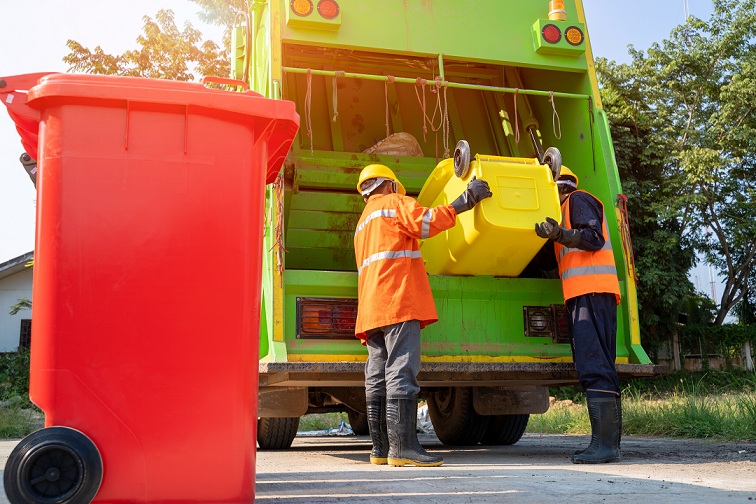Domestic rubbish is an inevitable byproduct of our daily lives. From food waste to packaging materials, we generate a significant amount of waste that needs to be disposed of responsibly. This article will delve into the journey of domestic rubbish after it is collected from our homes, exploring the various waste management methods employed to minimize the environmental impact.
Table of Contents
The Problem with Landfill Sites and the Need for Recycling
In the past, household waste has commonly been discarded in landfills. Nonetheless, these areas are swiftly approaching their limits, presenting a noteworthy peril to the environment. Landfills discharge detrimental greenhouse gases and taint the soil and water. As a countermeasure, recycling has emerged as a pivotal resolution. By diverting waste away from landfills and repurposing valuable resources, recycling alleviates the pressure on the environment and conserves energy.
The Process of Recycling Domestic Rubbish
The journey of recycling commences the moment your household waste is gathered. After the waste is conveyed to a recycling center, it goes through a sequence of stages to segregate diverse materials. Employing cutting-edge sorting methods like magnetic separators and optical scanners, the facility distinguishes and segregates recyclable substances such as paper, plastic, glass, and metal. Subsequently, these materials undergo processing and are ready for subsequent use.
Commonly Recycled Items and How They Are Repurposed
Recycling gives us a second life to many items that would otherwise end up in landfills. Paper waste, for example, is transformed into new paper products through a process of pulping, cleaning, and reformation. Plastic bottles are melted down and transformed into new plastic products, reducing the demand for virgin plastic. Glass is crushed into cullet, which is then mixed with new raw materials to create new glass items. Metal, such as aluminum and steel, is melted and reshaped into new products, saving energy and reducing the need for mining.
The Impact of Fly-Tipped Items on the Environment
The unauthorized disposal of waste, commonly known as fly-tipping, has escalated into a substantial environmental worry. Beyond marring our localities’ visual appeal, it gives rise to significant perils for wildlife and ecosystems. Dumped objects, ranging from aged furnishings and appliances to construction remnants, can release noxious substances into the soil and water, consequently contaminating the environment. The duty falls upon us to report and discourage fly-tipping, thereby guaranteeing the correct waste disposal practices and safeguarding our environment.
Understanding WEEE Waste and Its Proper Disposal Methods
Waste Electrical and Electronic Equipment (WEEE) comprises a classification of waste demanding distinct consideration due to its potential for harm. Discarded items like outdated computers, televisions, and refrigerators belong to the WEEE category. These objects encompass perilous elements like lead, mercury, and brominated flame retardants, which can pose risks if not dealt with appropriately. Appropriate disposal approaches for WEEE waste encompass transporting it to assigned recycling facilities or coordinating collection through authorized waste management entities.
Alternative Waste Disposal Options for Domestic Rubbish
Beyond the conventional practices of recycling and landfill deposition, there exist alternative pathways for managing household refuse. One such approach is incineration, where waste is subjected to high temperatures to yield energy. While this technique diminishes waste volume and generates electricity, it doesn’t escape environmental apprehensions. Composting stands as another avenue, especially suitable for biodegradable waste such as food remnants and garden clippings. Composting facilitates the organic waste’s natural decomposition, yielding nutrient-enriched soil suitable for gardening and agricultural purposes.
The Role of Waste Management Companies in Handling Domestic Rubbish
Companies specializing in waste management hold a crucial position in the responsible management of household refuse. Their responsibilities encompass the collection, transportation, and disposal of waste in alignment with rigorous regulations and standards.
Leveraging their proficiency and assets, these entities handle diverse forms of waste, including hazardous substances, ensuring proper treatment or disposal. Collaborating with waste management enterprises empowers individuals and communities to play a role in fostering a more pristine and healthful environment.
Tips for Reducing Domestic Waste and Practicing Sustainable Waste Management
Reducing domestic waste not only benefits the environment but also saves resources and money. Here are some tips for practicing sustainable waste management:
- Reduce, Reuse, Recycle: Embrace the concept of the three Rs by reducing your consumption, reusing items as much as possible, and recycling materials that can be repurposed.
- Purchase Wisely: Opt for products with minimal packaging and choose durable items that will last longer, reducing the need for frequent replacements.
- Compost: Set up a compost bin in your garden for organic waste, such as fruit and vegetable scraps, coffee grounds, and yard trimmings. This will help reduce the amount of waste that goes to landfills.
- Donate or Sell: Instead of throwing away items that are still in good condition, consider donating them to charities or selling them online. This extends the lifespan of the products and reduces waste.
- Educate and Engage: Spread awareness about the importance of responsible waste disposal within your community. Encourage others to join recycling programs and participate in clean-up initiatives.
The Importance of Responsible Waste Disposal
Responsible waste disposal is crucial for the health of our planet and future generations. By understanding the journey of domestic rubbish after waste removal, we can make informed choices and adopt sustainable waste management practices. Recycling, reducing waste, and engaging with waste management companies are key steps towards a cleaner and more sustainable future.

